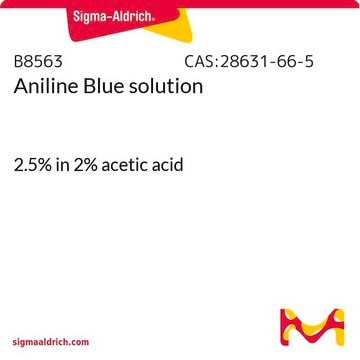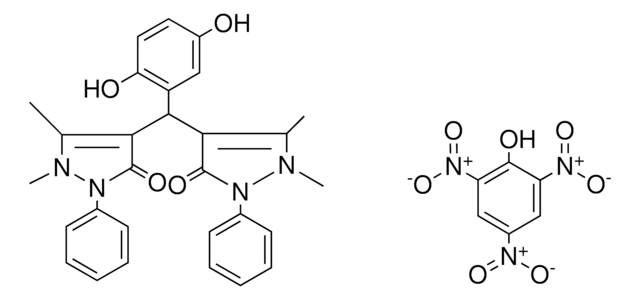HT10132
Bouin′s solution
histological fixative
Synonyme(s) :
Bouin’s fluid
About This Item
Produits recommandés
Durée de conservation
Expiry date on the label
Composition
acetic acid, 5%
formaldehyde, 9%
picric acid, 0.9%
Couleur
yellow
Application(s)
hematology
histology
Température de stockage
room temp
Vous recherchez des produits similaires ? Visite Guide de comparaison des produits
Description générale
Application
Additionally, it has been used for the following purposes-
- staining of human liver biopsy tissue samples for two-photon excited fluorescence (TPEF) and second-harmonic generation (SHG) imaging
- fixation of rat ovaries for the observing follicle cells using microscopy
- fixation of gonads of crab for morphological and histological analysis
Actions biochimiques/physiologiques
Mention d'avertissement
Danger
Mentions de danger
Classification des risques
Acute Tox. 3 Inhalation - Acute Tox. 4 Dermal - Acute Tox. 4 Oral - Carc. 1B - Eye Irrit. 2 - Muta. 2 - Skin Irrit. 2 - Skin Sens. 1 - STOT SE 2 - STOT SE 3
Organes cibles
Eyes,Central nervous system, Respiratory system
Code de la classe de stockage
6.1C - Combustible acute toxic Cat.3 / toxic compounds or compounds which causing chronic effects
Classe de danger pour l'eau (WGK)
WGK 3
Point d'éclair (°F)
Not applicable
Point d'éclair (°C)
Not applicable
Équipement de protection individuelle
Faceshields, Gloves, Goggles, type ABEK (EN14387) respirator filter
Certificats d'analyse (COA)
Recherchez un Certificats d'analyse (COA) en saisissant le numéro de lot du produit. Les numéros de lot figurent sur l'étiquette du produit après les mots "Lot" ou "Batch".
Déjà en possession de ce produit ?
Retrouvez la documentation relative aux produits que vous avez récemment achetés dans la Bibliothèque de documents.
Les clients ont également consulté
Notre équipe de scientifiques dispose d'une expérience dans tous les secteurs de la recherche, notamment en sciences de la vie, science des matériaux, synthèse chimique, chromatographie, analyse et dans de nombreux autres domaines..
Contacter notre Service technique










